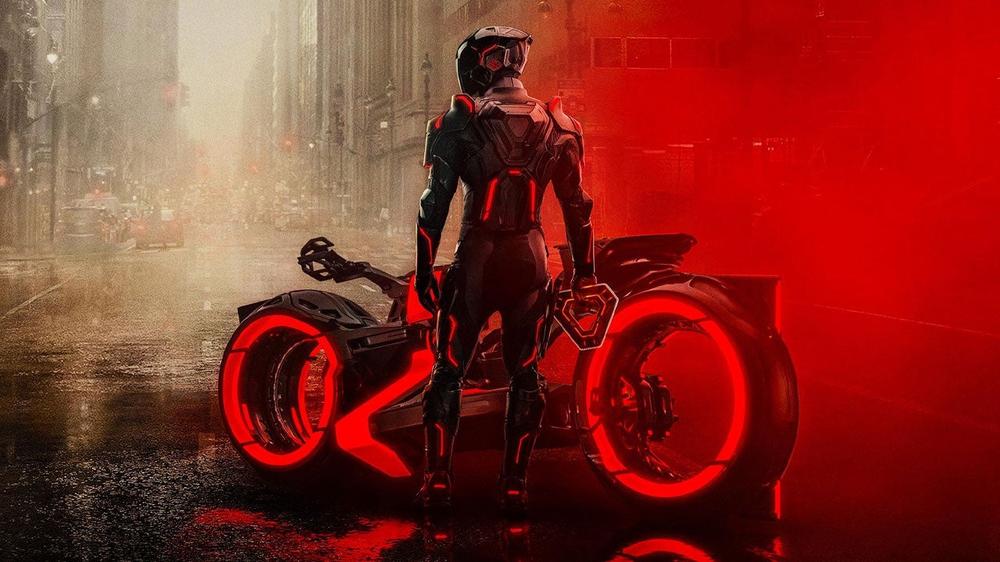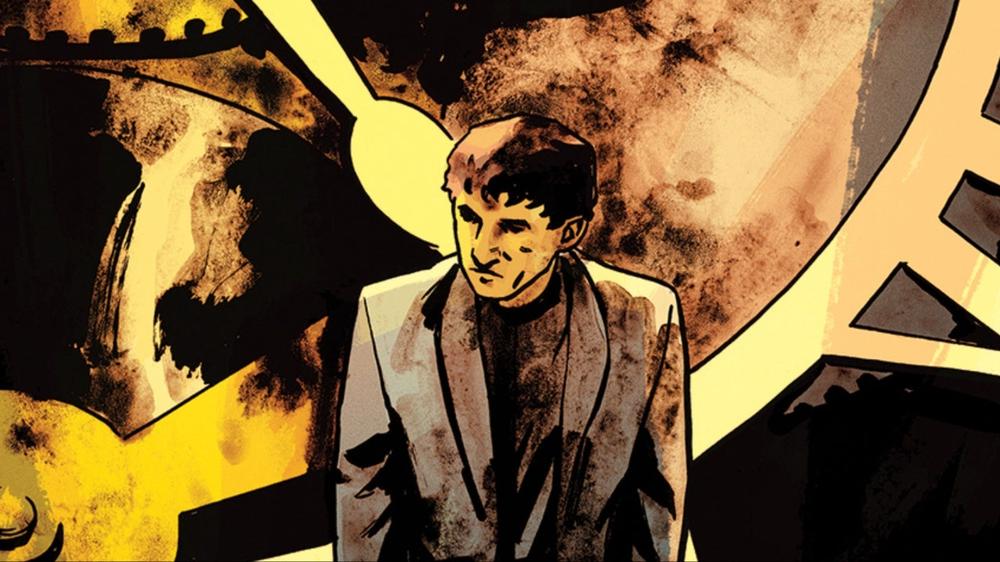I wish I could say Tron: Ares picked up where Tron: Legacy left off in 2010, continuing the story of both the Flynn family and the interesting question posed by the film's final shot: What happens when programs from The Grid show up in the real world? Tron: Ares instead seems intent not only on ignoring Legacy completely, but also misreading what made the original such an icon in the first place.
Tron as a franchise is a curious thing to me. The original is an undeniable cult classic. Not a flop, not quite a hit, it didn’t gain a following until later. It may seem like a campy little blast watching it now, but in 1982 it was cutting edge in all the ways, from the computer graphics on screen to the questions it raised about computers, a technology that society in general didn’t really know where we were going with at the time. The sequel made nearly 30 years later did a fine enough job following that up, but now, 15 more years on, it’s hard to tell why or for whom another Tron movie has been made.
I promise this isn’t going to be all about the first Tron, but it does have a bearing on what I think the near total failure of Tron: Ares is about: a misunderstanding of the franchise and what makes it interesting in the first place. It’s also not technically me that’s constantly bringing up the first Tron. Ares is determined in its attempts to honor that film, but to what end? For example, it features both a completely functional recreation of Kevin Flynn’s old office in the middle of Encom’s headquarters as well as his actual old office in Flynn’s Arcade and it's the facsimile of the thing that plays a bigger role in the film than the original thing itself, which makes for a truly unfortunate metaphor for why this movie is so uninteresting.
Ares follows another battle for control over tech corporation Encom, and there’s another Dillinger in one corner as the antagonist, opposed by Encom CEO and brand new character to the franchise, Eve Kim. Greta Lee as Eve is doing good work, as is Evan Peters who seems to be having a blast chewing scenery as Julian Dillinger. The film sets up a plucky cohort for Eve (Arturo Castro), a mother for Julian (Gillian Anderson) and a macguffin for them both to chase, plus a ticking corporate clock to keep in mind. It's all very familiar territory narratively.
Now, if that were all there was to the central conflict of the movie, maybe the film could’ve mined it more effectively but it would still be missing the point of Tron in general. There’s a counter-culture aspect to the original movie that this installment is missing completely. Kevin Flynn was just a talented dude (who would later become The Dude) from whom a corporate stiff stole everything. That’s as relatable a story as there is, which is enormously important for a film about being zapped into a computer to play death sports with anthropomorphic programs. With Ares though, and the warring billionaire CEOs, there’s nothing quite so likeable about their conflict. There’s a clear hero, a clear villain, but outside of the fact that we’re all aware that’s how movies are supposed to work, there’s nothing much to care about anywhere in their story.
The other half of the central conflict is Jared Leto’s Ares. It’s not an understatement to say the entire movie hinges on his storyline, which in turn relies completely on us caring about him. But we never get a real reason to do so. We see only glimpses of him struggling with the new idea of “feelings” and move on before any of them actually land. Ares is a product of Dillinger’s ambitions, as we see in the trailers, he’s supposed to be unstoppable, top of the line tech, but Dillinger is mostly just describing a fantasy 3D printer to an audience of high-ranking officials as though it’s crashing through the boundaries of imagination. Leto, for his part, is actually deployed pretty well. Ares has a robotic aloofness to all of his actions that the actor has in spades, but still, his Terminator vision-style HUD literally displays his thoughts from time to time and that’s just about all we get.
So Tron: Ares is a straightforward, mostly paint-by-numbers franchise entry. There’s nothing in the story, nothing in the visuals that you haven’t seen before. That’s maybe the least surprising thing I could’ve spent this whole time writing about. What I find more frustrating about this movie is that, more than I think any other franchise that goes back to the ’80s, this movie has nothing to offer but nostalgia. Jeff Bridges reprises his role, kind of, in a glorified cameo that you can find out about for yourselves, but I will say, like the museum exhibit version of Flynn’s office, there are several plot points that revolve around in-universe nostalgia.
As a specific (but non-spoiler example) there’s a spot in most movies which structurally comes between the end of Act 1 and the mid-point. It’s a bit of a downbeat in the tempo, where the main characters can catch their breath and have an on-the-nose conversation about the movie's themes. It happens in almost every movie. Tron: Ares uses this time to have an earnest talk about whether they should reboot pop culture icons for profit or try to better humanity. For movie number three in a franchise that maybe shouldn’t have been a franchise in the first place, it’s difficult to take it seriously when their answer is “we should use our resources to better humanity.” Tone deaf isn’t quite the right word, because I don’t believe there’s any sort of intent behind it; oblivious might be more appropriate. That rebooting Tron is actually part of the story of Tron’s second sequel just feels like a desperate snake eating its own tail.
The other thing worth talking about here is the decision to bring most of the movie out into the real world. Even though the end of Tron: Legacy raised that question with Quorra (Olivia Wilde) coming out of The Grid with Sam (Garrett Hedlund), Ares makes it clear from the opening moments that none of that movie's story matters. That’s not to say Quorra and Sam deserve better or that Legacy was some unimpeachable second chapter that should not be ignored; it’s that there was no real need to deal with the same issues from scratch. There was groundwork for a third movie effectively laid out already, and yet the third movie we got attempted to set up the same idea on its own. It's actually much clunkier to write off the events of Legacy than to just pick them up and continue them.
Like Legacy before it, Ares is another Tron sequel that introduces another Grid, and the moments when this movie is visually interesting take place there. There’s also a kernel of a fun idea in escalating The Grid leaking into the real world. Like Clu’s plans to invade meat space in Legacy, the potential for an all-out war is just sitting right there. Jodie Turner-Smith is a solid hench as well as Athena, leading the angry charge into the climactic showdown, so the pieces were in place. There was also clearly some thought put into how these digital creations would interact with things here in the real world. The light cycles and the physicality of their tails are deployed in a new way or two, but they do exactly the wrong amount of it. I couldn’t help but compare all The Grid action that takes plays in the real world unfavorably to the threat of legions of programs marching through the streets that was teased and thwarted in Legacy.
But this was never going to be a big digital war movie and while I don’t believe you can really dock a movie for not being a different movie, you can have complaints about half-measures. And ultimately that’s Tron: Ares’ biggest problem. Everything it’s trying to do is right there on the surface, but none of it is done all the way. Its title character's journey is scribbled in shorthand, its two opposing forces are broadly drawn, there’s nothing new or inventive about the look of the film and it doesn’t add anything meaningful to the franchise. This movie is just ultimately extremely mediocre. It’s “fine, I guess” all the way through, but the weirdest part is it’s hard to tell who this movie was made for.
I will close by mentioning the one thing that I truly loved about the movie, which is the relentless Nine Inch Nails. Normally I recommend seeing a tentpole movie like this big, but here I think the only requirement is that you see it loud. The music is mixed to be front and center throughout the whole movie, and it’ll rattle your teeth in all the best ways. It’s eerie and curious and moody and the atmosphere it provides earns the top-billing Nine Inch Nails has been getting in the promotion of the film. The opening bit of music especially caught my attention. There’s an atonality to its pieces that makes them not quite fit together. The electronic tones stretch and warp in ways that feel uncomfortably like what we’re witnessing just isn’t quite right. It winds up, unintentionally I imagine, being the perfect piece of music for the movie it introduces.

 Megalopolis: An Original Graphic Novel Adapts 2024's Most Divisive Film
Megalopolis: An Original Graphic Novel Adapts 2024's Most Divisive Film